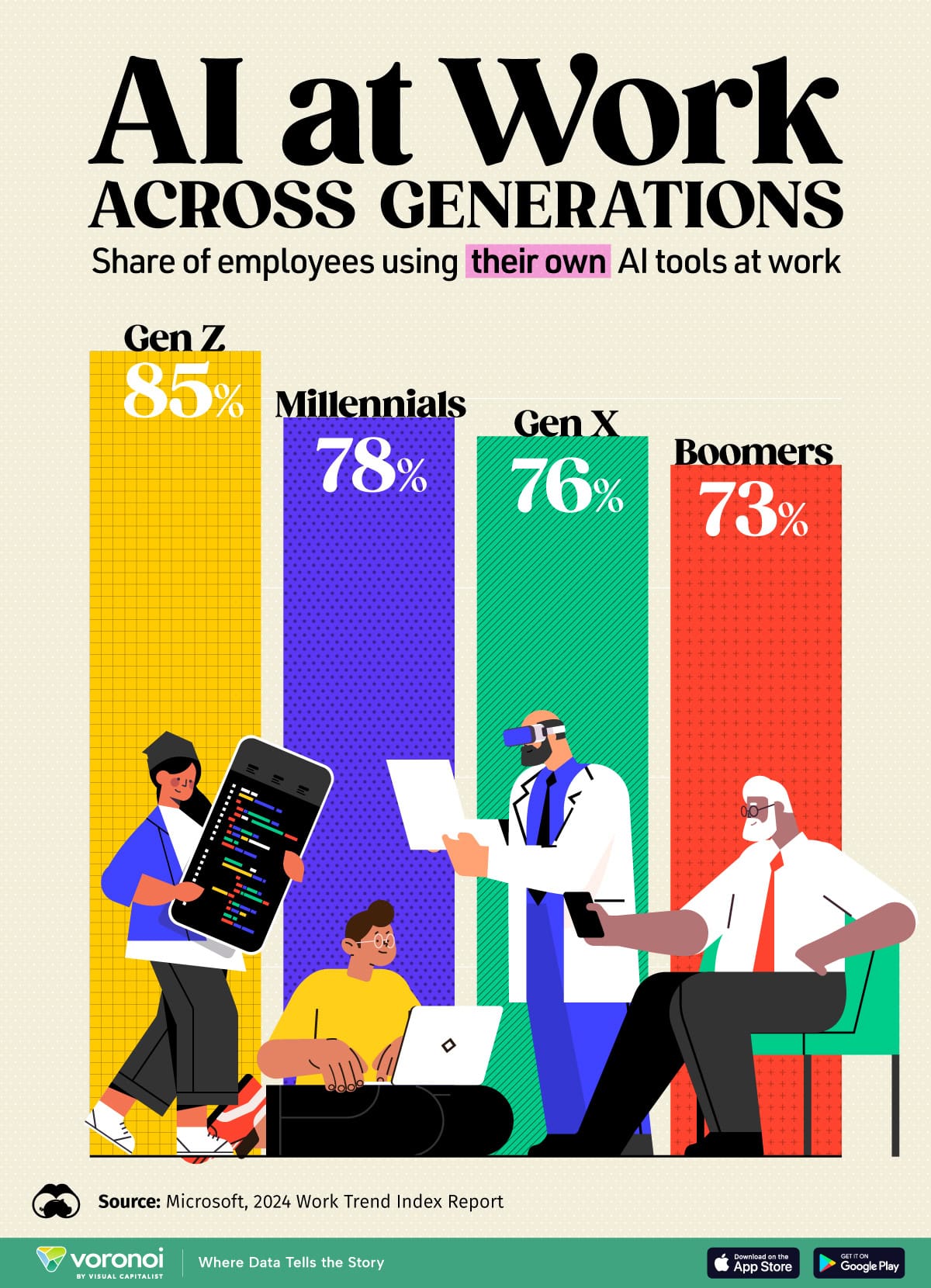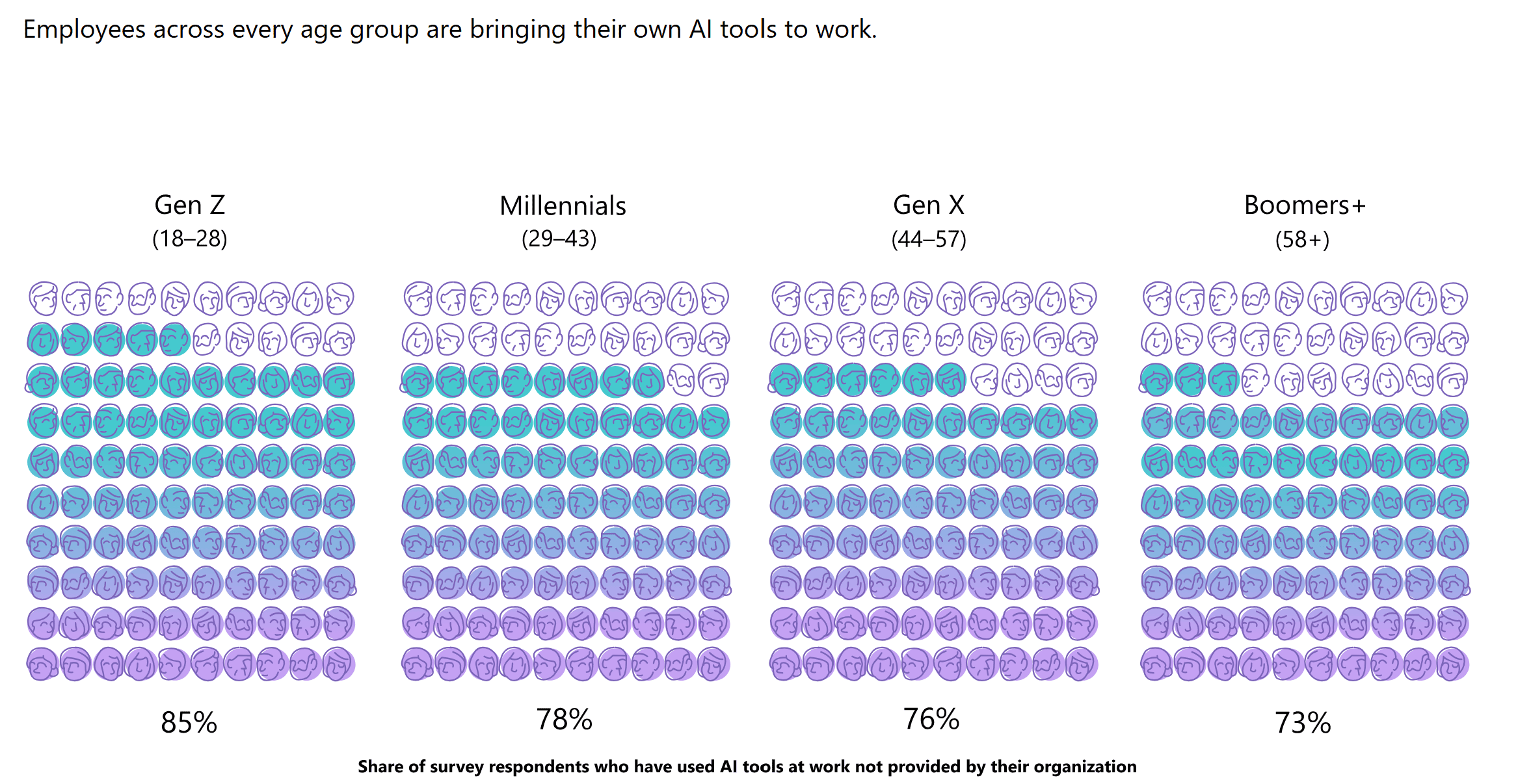Table of Contents
- The Invisible Ally: AI in the Workplace
- AI Is Everywhere — But Not (Yet) Official
- The Risk of Hidden Adoption
- AI Skills Are Becoming Strategic
- Toward Conscious AI Empowerment
Humans have always sought to create tools that simplify life and boost productivity. Every innovation has marked a leap in efficiency from the wheel to the computer. Artificial Intelligence is simply the latest — and perhaps the most revolutionary — addition to our toolkit. But how is it truly reshaping our daily work, and how does this shift differ across generations?
The Invisible Ally: AI in the Workplace
Over the past two years, tools like ChatGPT and Gemini have rapidly changed how we tackle complex tasks — idea generation, document summarization, research, and data analysis. AI is no longer just a buzzword at tech conferences; it’s now a hands-on tool embedded in the daily workflows of millions of knowledge workers.
The most surprising stat? Across all four generations currently active in the workforce — from Boomers to Gen Z — between 73% and 85% of workers already use personal AI tools in their everyday routines. Gen Z is leading the charge, with an impressive 85% adoption rate, driven by their native tech fluency and a job market that increasingly values AI skills.

AI Is Everywhere — But Not (Yet) Official
Despite widespread use, many companies still lack a clear AI adoption strategy. This has created a paradox: employees use AI, often without formal guidance or policies. Around 78% of knowledge workers bring their own AI tools to work — a phenomenon known as BYOAI (Bring Your Own AI) — and in small and medium-sized businesses, that figure jumps to 80%.
But it’s not all smooth sailing. Over half (52%) of users are hesitant to admit they use AI for critical tasks, and 53% worry that doing so might make them appear easily replaceable. This climate of uncertainty is holding back broader adoption and limiting the strategic value AI could unlock if implemented systematically and securely.

The Risk of Hidden Adoption
Without clear governance, AI use can expose companies to data security risks — a major concern for today’s business leaders. And yet, the pressure to adopt is mounting: 79% of executives believe embracing AI is key to staying competitive, though 59% admit they struggle to measure its productivity gains. Alarmingly, 60% fear their organizations lack a clear vision for AI implementation.
AI Skills Are Becoming Strategic
In this fast-moving landscape, professionals aren’t waiting for top-down direction. Around 76% believe mastering AI is crucial for staying competitive in the job market. 69% see it as a career accelerator, and 79% believe AI skills will open new opportunities.
A new type of professional is emerging: the power user. These individuals use AI daily and are seeing real, tangible benefits — saving over 30 minutes a day, reducing mental load (92%), boosting motivation (91%), and improving work quality.
What sets them apart? A mindset geared toward experimentation. Power users are 68% more likely to explore new AI applications, 49% more likely to ask whether AI can help before starting a task, and 56% more proactive in testing new prompts.
LinkedIn confirms the trend: usage of AI skills courses has grown by 160% in just six months among non-technical professionals. The most active roles? Project managers, architects, administrative assistants — as well as writers, designers, and marketers who see AI as a practical tool for enhancing both efficiency and creativity.
(Source: AI at Work Is Here. Now Comes the Hard Part, Microsoft)
Toward Conscious AI Empowerment
AI is redefining work in all its forms, and every generation is playing a role in this transformation. But to move from individual adoption to systemic impact, we need a shared vision. Companies must provide training, clear policies, and secure tools to integrate AI strategically, ethically, and at scale.
The future of work isn’t just “with AI” — it’s one where every employee, regardless of age or role, can become a conscious power user. The first step? Building a workplace culture that turns hidden AI adoption into shared innovation.
AI Evangelist and Marketing specialist for Neodata
- Diego Arnonehttps://neodatagroup.ai/author/diego/
- Diego Arnonehttps://neodatagroup.ai/author/diego/
- Diego Arnonehttps://neodatagroup.ai/author/diego/
- Diego Arnonehttps://neodatagroup.ai/author/diego/